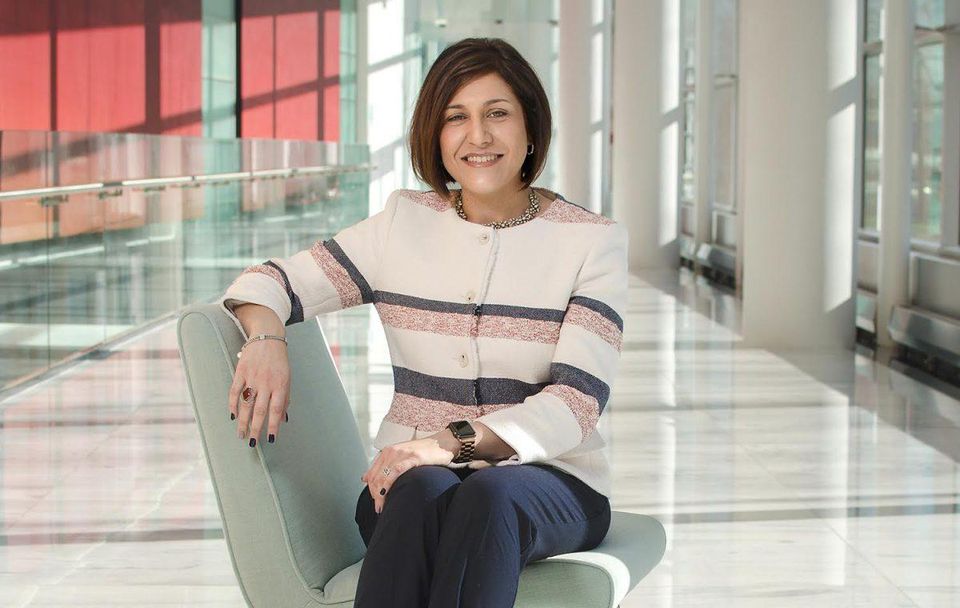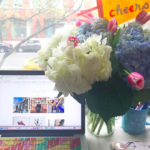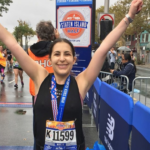Like many young journalists, Maribel Perez Wadsworth started her journalism career working at local publications. Now she oversees more than 100 local news and niche content brands as Gannett’s president of USA TODAY NETWORK and associate publisher of USA TODAY. The journalism landscape is ever-changing and Wadsworth leads the Gannett Innovation Lab, which develops emerging technologies to enable new forms of storytelling and to power new products, tools and experiences and serves as an incubator for internally generated product concepts. We spoke about her career path from covering corn and soybeans to sitting in the C-suite and her candid career advice.

How did you end up at Gannett? What was your career path?
Maribel Wadsworth: I married my husband and joined Gannett the same year and people often joked about which marriage would last longer. Nearly 22 years later, I can thankfully say both are still going strong. It was probably only because of my husband that I joined Gannett when and where I did. I’d been working at the AP Miami bureau right out of college, wearing many hats and occasionally getting to cover big national and state stories — so I was feeling pretty on top of the world. My then-fiance was working as a reporter and anchor at the ABC-affiliate in Rockford, Illinois, at the time, and well, I chose love and moved across the country. That led to my first job at Gannett where I was the agriculture beat reporter at the “Rockford Register Star.” It was one of the best decisions I’ve ever made.
After working in Rockford for two years, my husband had an opportunity to take his career to Southwest Florida, which is closer to home for me and as chance would have it, home to The News-Press in Fort Myers, another Gannett property. The editors at the two newsrooms spoke and I was on my way to a new reporting gig in Fort Myers, a place we just fell in love with. I rose up the ranks, taking on new reporting and editing roles — and adding three sons to our family — until I ultimately ran custom publishing and then became managing editor for digital at The News-Press. I was there for 13 years before joining the corporate news team in McLean, Virginia, as a digital news executive leading digital content strategy for our local newsrooms in the U.S. Community Publishing division.
Over time I become more involved in cross-divisional initiatives that had me learning and leading projects from the business side — and I found I was just as passionate about helping to protect and grow the business of journalism as I was about being on the front lines as a reporter and editor.
Today, I find myself in a very unexpected, and humbling, place. If you’d asked me 20 years ago if I thought I’d find myself in the C-suite of one of the country’s largest media companies, I’d have told you it was far more likely I’d still be reporting on corn and soybeans in Rockford.
What is a workday as Maribel like? Please walk me through a day!
I could walk you through yesterday but have to admit it may look nothing like tomorrow — but that’s what I love about my role!
My average day will span a range of topics and activities – from meeting with our corporate development team to weigh the pros and cons of an investment, working with our head of video to align on content and marketing strategy for a new video series, fine-tuning the business plan for a new product launch, reviewing key audience metrics to assess whether we’re meeting our goals — or, at times, to better understand why not. Often, various teams will schedule time to pitch me on a project that requires investment — such as our virtual reality news program VRtually There, or a pilot program to equip our newsrooms with drones, or a full redesign of our web platforms. While not every project will get a green light, I enjoy the creative process and the passion our teams bring to their ideas.
If there’s a common theme, it’s that my role any given day across this wide-ranging portfolio is to keep us honest to our commitments — to our customers, and to ourselves. Are we doing enough, and doing it quickly enough to differentiate ourselves and consistently deliver value to our customers? Are we embracing experimentation to build on successes and move on from failures, satisfied that we learned and are proud of our agility? Are we purposeful and intentional in our choices, focused on doing fewer things better rather than running at myriad things? It’s not just my job to ask those questions, it’s my job to ensure those questions are the guideposts for decision making across our company.
Outside of my day-to-day at Gannett, I also serve on a number of boards including Digg (one of our investments) and the International News Media Association.
What are your responsibilities as president of USA TODAY NETWORK and associate publisher of USA TODAY?
In my current role, I lead our $1 billion consumer division, overseeing strategy and operations for all of our media brands, including USA TODAY, 109 local news organizations and a growing portfolio of niche passion brands such as our recent investment in Grateful Ventures. My organization, most simply put, is primarily focused on audience development and engagement. It’s our responsibility to know the audience we already serve as deeply as we can and to ensure our content and products align to their needs. It’s also our responsibility to understand where we have opportunities to grow and to create, partner with or acquire new products and services that help us to reach new audiences. Also in my purview is the Gannett Innovation Lab, which is focused on using emerging technologies to enable new forms of storytelling and to power new products, tools and experiences. The Lab also serves as an incubator for internally generated product concepts — often the result of our annual Innovation Challenge program.
My core mission is ultimately sustaining and nurturing the pioneering spirit of the company that upended convention and launched USA TODAY in 1982. Now, 35 years later we’re the first company to launch a weekly VR experience and continue to create unique VR and 360-degree opportunities for our audience and our advertisers.
Please tell me more about the Gannett Innovation Lab!
The Lab is a department designed to explore emerging tech and to push storytelling experiences for the USA TODAY NETWORK, which consists of more than 100 local news organizations and USA TODAY. When not prototyping or experimenting, the Lab also champions an internal Innovation Challenge, a hybrid intrapreneurial development program and idea tournament for the company. A recent success out of the Challenge has been Humankind, which garners more than 100 million video views each month. The world clearly needed the kind of happy-cry escapes Humankind delivers.
What are the most important characteristics someone needs to have to be successful in your role?
Thick skin, a high-degree of tolerance for change and uncertainty and a good poker face — I’m still working on the latter.
Joking aside, many of the things that made me a good reporter are what serve me best today. Permission to ask anything that will help me get smarter about what I don’t know. A willingness to press on, even in the face of tremendous obstacles, to get to the heart of a matter or see a project through. (I often say grit is my one superpowers). A firm belief that a strong team and strong relationships are the keys to success.
And I wasn’t joking about a high degree of tolerance for change, that’s absolutely required. I don’t mean a roll-with-the-punches kind of tolerance, though flexibility is certainly important. I mean a willingness to drive change — to break some dishes on occasion. To embrace experimentation and the inevitable failures is the only sure paths to learning and sustainability. I often hear people say they want to “get comfortable” with the choices or decisions before us. In my world, if you’re comfortable, you’re not doing it right. I often tell my team,“your comfort level is not our threshold for success.”
What are the most important skills for doing your job and how did you develop them?
There are three skill sets that I believe are important in doing any job: listening, communicating effectively and understanding the big picture.
Those sound trite, so let me offer a little color.
In listening, I mean with a focus on learning, on uncovering something you didn’t know or that can and should influence your decisions. Too often, people are “listening,” awaiting confirmation of what they already believe. So listen, allow yourself to be challenged and you will almost inevitably learn something useful.
Communicating effectively means ensuring you’re relatable to your audience. You must take the time to understand the needs and motivations of your audience and ensure that’s reflected in both your words and how you choose to communicate. Doing that requires spending time with various stakeholders and building relationships with key influencers across the organization. The investment is invaluable, but often it is completely overlooked. Effective communication requires achieving mutual understanding — not agreement necessarily, but understanding.
To get there, you need to see the big picture. For me, that’s the “why and so what?” You need to connect the dots effectively between the decision made and its impact on our customers, the marketplace and/or our business results.
What’s the biggest lesson you learned at work and how did you learn it?
What is one thing that you wish you had known when you were starting out your career?
Being right isn’t important if you don’t have the influence to effect change or command the respect and trust of your colleagues. Brains you were born with, but influence is earned. Your investment of time, letting others’ ideas rise and giving credit where due, rolling up your sleeves to put in the hard work in the trenches, walking in your colleagues’ shoes and leading with empathy — those actions, sincerely and authentically committed, will pay dividends over your career. For me, that’s true in all aspects of life.
What is the best advice you’ve ever received?
The best advice I received was you can be good at everything, but not at the same time. I think women, especially, often bear the burden of “having it all,” and it is true that juggling the titles of wife, mom and executive is not always easy. In fact, it’s a good thing for me that success isn’t measured in one-day increments, because truth be told, some days just aren’t that pretty. But keeping focused on the long haul, on your aspirations over your whole life will help you prioritize the crucial moments for each part of your life so that you bring your best self to those moments. It will help crystallize the wins — like when you took that red-eye to make sure you made it to your son’s pre-k graduation (and he was thrilled!) — and keep the rest in perspective. On the whole, you’re no doubt kicking butt in life. It’s just that nobody’s a rock star every minute across everything. So breathe, you’re doing great!
What is your career advice for other young professional women?
My best advice to all young professionals, not just women, is this: your seat at the table is only as valuable as your willingness to use it. Early on in my career, I would often hang back in meetings, ideas punching at the inside of my mouth, but lips sealed firm in the knowledge that “it was not my turn” or “surely, somebody else has already thought of it.” After all, “these people have been doing this a lot longer than I have.” Certainly experience counts for something. But so does diverse perspective and fresh perspective. Your unique lens on the issue at-hand may offer the next great idea or, minimally, spark ideas in others that build toward new solutions and new thinking. Also, don’t assume you’re the only one in the room who doesn’t know the answer. Be willing to ask the question. It’s likely you hit on something someone else was wondering too. Worst case, you learn something new and are seen as curious and engaged.
Now, for the women specifically? Help your fellow women rise to their best selves. Have each others’ backs. When a female colleague is overtalked in a meeting, make sure that is lost on no one. A simple, “Maggie, were you finished with your thought?” works nicely. Polite and pointed. Give back your time and experience. Be a mentor, seek a mentor. And please, please don’t share the Facebook version of your career, be honest about the challenges and the stumbles. We’ll all be better for it.
































